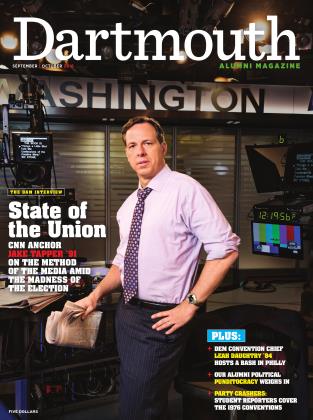Lighting Up a Room
The cartoons—and compassion—of Steve Brosnihan ’83
SEPTEMBER | OCTOBER 2016 Noel RubintonThe cartoons—and compassion—of Steve Brosnihan ’83
SEPTEMBER | OCTOBER 2016 Noel RubintonOne evening six years ago Steve Brosnihan ’83 was saying goodbye to a teenage patient. Looking out the window at Hasbro Children’s Hospital in Providence, Rhode Island, where he’s resident cartoonist in the healing arts department, Brosnihan noticed his route to the bus was visible. He spontaneously told the boy to watch outside later for a sign. When he signaled to the boy with his flashlight on his way home, Brosnihan was surprised and pleased to see the boy flicking a light in response. So Brosnihan made it his routine to flash goodnight to his patients, many of whom told him it was the best thing that happened all day. “A feeling of loneliness is alleviated,” Brosnihan says.
Since 1991, Brosnihan has logged thousands of hours drawing at the bedside of seriously ill children. He helps young patients with their fears and anxieties and he’s called in like a specialist, with the goal of getting a smile or laugh from a child deep in the doldrums. He devised a method, “Cartoonagrams,” to quickly teach children to join him in cartooning, using letters of the alphabet. Last year Brosnihan expanded his Goodnight Lights idea, asking local businesses, including tugboats and a bar with a large neon sign, to communicate with four blinks for “Good Night Hasbro Hospital” each night at 8:30. Businesses and patrons, who use phones or other lights, have been eager to participate. He’s working on involving buildings in the nearby downtown skyline. “People are feeling the thrill that someone is thinking about them in a free will, goodwill gesture,” Brosnihan says.
When the former visual studies major, who also teaches at schools and camps for children with medical and other special needs, walks the halls of the hospital, he carries a clipboard. Taped to its back is a talisman—a worn copy of a handwritten note from a fellow Dartmouth alum, Theodor “Dr. Seuss” Geisel ’25. “He was wonderfully supportive of me becoming a cartoonist,” Brosnihan says. Months before he died, Geisel wrote to wish Brosnihan luck for “six years, hell, make it the next six decades.”
Noel Rubinton
 View Full Issue
View Full Issue
More From This Issue
-
 Feature
FeatureThe Party Crashers
September | October 2016 By RICK BEYER ’78 -
 FEATURE
FEATUREPeacemaker
September | October 2016 By Matthew Mosk ’92 -
 THE DAM INTERVIEW
THE DAM INTERVIEWState of the Union
September | October 2016 By JULIA M. KLEIN -
 RETROSPECTIVE
RETROSPECTIVEValediction
September | October 2016 By SUE SHOCK -
 FACULTY OPINION
FACULTY OPINIONI Read, Therefore I Think
September | October 2016 By DEVIN SINGH -
 classnotes
classnotesDeaths
September | October 2016
Voices in the Wilderness
-
 VOICES IN THE WILDERNESS
VOICES IN THE WILDERNESSBravissimo!
MARCH | APRIL By Abigail Drachman-Jones ’03 -
 Voices In the Wilderness
Voices In the WildernessBrian Mann '02
NOVEMBER | DECEMBER 2021 By David Holahan -
 VOICES in the Wilderness
VOICES in the Wilderness“A Meditation”
JANUARY | FEBRUARY 2017 By Heather Salerno -
 Voices in the Wilderness
Voices in the WildernessMinimalist Luxe
MAY | JUNE 2017 By HEATHER SALERNO -
 Voices in the Wilderness
Voices in the Wilderness“Special Adventure”
JULY | AUGUST 2021 By Nancy Schoeffler -
 Voices in the Wilderness
Voices in the WildernessJonathan Beane ’92: Tackling Justice
JANUARY | FEBRUARY 2021 By Sean Plottner

